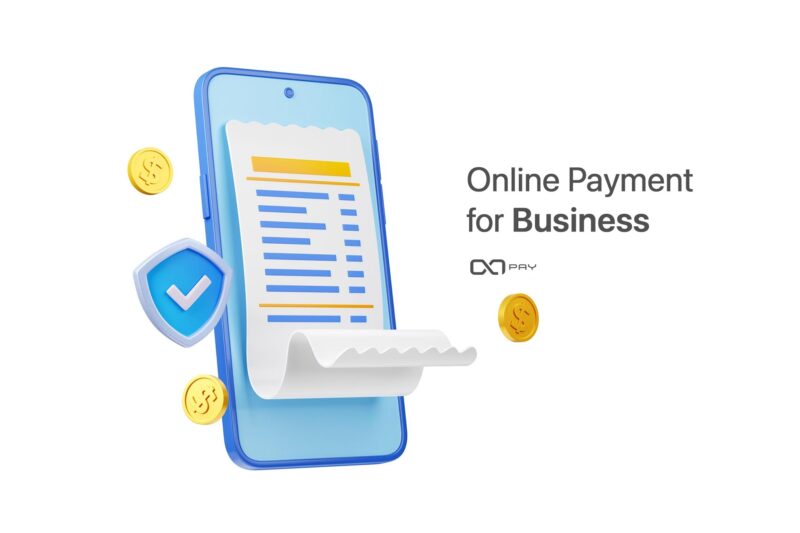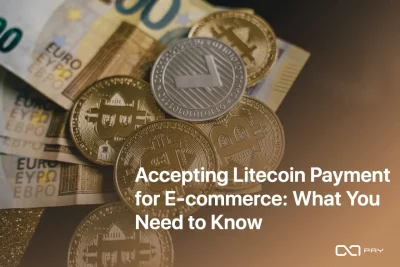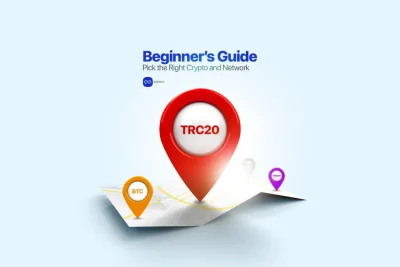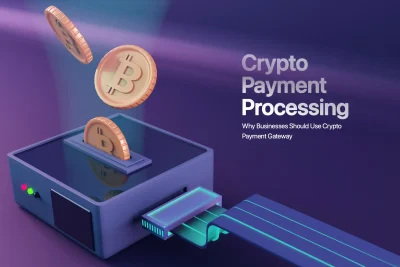As a business owner, you want to ensure your customers have a smooth and secure way to pay for your products or services. This is where online payment processing comes in, offering a convenient alternative to cash and checks. Understanding what online payments are and how they function is crucial for choosing the most suitable payment method for your business But with so many options available, choosing the right online. This guide will break down the basics of online payments and highlight a cutting-edge option for your business: crypto payments with OxaPay.
What Is Online Payment?
Online payment allows the business to electronically transfer money from the customer in exchange for goods or services, facilitated over the internet. This method provides a quicker, safer, and more convenient alternative to traditional payment methods such as cash or checks, catering to the global shift towards digital transactions.
How Do Online Payments Work?
The typical online payment process involves several key players and steps:
- Customer: Initiates the purchase by selecting products or services.
- Merchant: Offers the goods or services online.
- Payment Gateway: Securely handles the transfer of payment information.
- Acquiring Bank: Processes the transactions on behalf of the merchant.
- Issuing Bank: Manages the customer’s funds and payment instruments (e.g., credit card).
The process unfolds as follows:
- The customer chooses their purchase and proceeds to checkout.
- They enter their payment details on the merchant’s payment page.
- The payment gateway encrypts this data and sends it to the acquiring bank.
- The acquiring bank requests authorization from the issuing bank.
- The system reserves the funds and processes the transaction upon approval.
- The merchant completes the order, and funds are settled into their account.
A Simplified Breakdown
Imagine a customer browsing your online store. When they reach checkout, they enter their payment information, such as a credit card number or digital wallet credentials. The payment gateway then securely transmits this information, acting as a middleman between your store and your bank. By encrypting the data, the gateway prevents anyone from intercepting it.
Next, the gateway communicates with the customer’s bank (or the credit card issuer’s bank) to verify the payment details and ensure sufficient funds are available. If everything checks out, the system authorizes the transaction and sends you a confirmation. Finally, the funds transfer from the customer’s account to yours, typically within a few business days.
Why Choose Online Payments?
There are numerous advantages to offering online payment processing for your business:
- Increased Sales: Convenience is king! Customers are more likely to complete purchases with the ease of online payments.
- Improved Customer Experience: A smooth checkout process fosters customer satisfaction and encourages repeat business.
- Enhanced Security: Online payment systems use robust security measures to protect sensitive customer data, reducing the risk of fraud compared to cash transactions.
- Streamlined Operations: Say goodbye to manual processing! Online payments automate much of the workflow, saving you time and resources.
- Global Reach: Open your doors to the world! Accepting online payments allows you to tap into a broader international customer base.
Choosing the Best Online Payment Method for Your Business
Selecting the right online payment method involves considering factors such as transaction fees, customer preferences, security measures, and ease of integration. While traditional methods like credit cards and bank transfers are common, alternative payments like e-wallets and cryptocurrencies are gaining traction for their additional benefits.
Crypto vs. Credit Card Payments: Which is Better for Your Business?
Introducing Crypto Payments:
Crypto payments involve transactions using digital currencies like Bitcoin and Ethereum, facilitated through blockchain technology. These payments offer a secure, fast, and low-cost alternative to traditional payment methods, bypassing intermediaries and providing enhanced privacy for users.
The Advantages
Crypto payments offer distinct advantages over traditional payment methods, including:
- Lower Transaction Costs: Cryptocurrencies typically have lower transaction fees than credit cards or banks.
- Enhanced Security: Blockchain technology provides advanced security features that reduce the risk of fraud.
- Faster International Transactions: Crypto transactions can be processed more quickly than those involving currency conversions and international banking processes.
- Increased Privacy: Customers can make payments without divulging sensitive financial information.
How crypto payments work with Crypto Gateway
Using a crypto payment gateway simplifies the process of accepting cryptocurrencies as payment, making it accessible and manageable for businesses. Here’s a step-by-step breakdown of how crypto payments work through a payment gateway like OxaPay:
1. Integration of the Payment Gateway:
The first step for a business is to integrate a crypto payment gateway into their existing payment system. This can typically be done through API integration that connects the business’s checkout system to the gateway. OxaPay, for instance, provides merchants with customizable payment APIs that can be easily integrated with popular e-commerce platforms.
2. Customer Chooses to Pay with Cryptocurrency:
During the checkout process, the customer selects the option to pay with cryptocurrency. The crypto payment gateway presents the customer with several cryptocurrency options, allowing them to choose their preferred cryptocurrency.
Exploring the Variety of Crypto Payments Options for businesses
3. Transaction Details Displayed:
Once the cryptocurrency is selected, the payment gateway automatically calculates the equivalent amount in the chosen cryptocurrency based on the current exchange rate. The gateway then generates a payment request, which includes the amount due and the merchant’s digital wallet address. This information is often displayed in the form of a QR code and a wallet address, which the customer can use to transfer funds.
4. Payment Initiation by Customer:
The customer uses their own cryptocurrency wallet to initiate the payment. They can do this by scanning the QR code or copying the wallet address into their wallet application and confirming the amount to send.
5. Verification and Processing:
The transaction is transmitted over the blockchain network, where it is verified by network nodes. This verification involves ensuring the customer has sufficient funds and that the transaction is secure and not fraudulent. Once verified, the transaction is added to the blockchain ledger.
6. Confirmation and Conversion:
The crypto payment gateway monitors the blockchain for confirmation of the transaction. Depending on the cryptocurrency used, this might take anywhere from a few seconds to several minutes. After confirmation, the gateway can, if configured by the merchant, automatically convert the cryptocurrency into stable currency, reducing exposure to price volatility. The converted funds are then transferred to the merchant’s bank account.
7. Transaction Completion:
The payment gateway notifies the merchant that it has successfully processed the payment. The merchant can then finalize and prepare the customer’s order for delivery. Both parties receive receipts and records of the transaction, ensuring transparency.
8. Reconciliation and Reporting:
The crypto payment gateway provides the merchant with tools for reconciling these transactions in their accounting records. This includes detailed reports on transaction histories, exchange rates applied, and the final amounts in stable currency.
By using a crypto payment gateway like OxaPay, businesses can streamline the acceptance of cryptocurrency payments, making the process as straightforward as traditional payment methods while leveraging the benefits of digital currencies. This setup not only enhances the security and efficiency of transactions but also opens businesses to a global market with reduced transaction fees and improved privacy for customers.
Why OxaPay Stands Out as a Crypto Payment Gateway
OxaPay distinguishes itself as a leading crypto payment gateway by offering robust support for a variety of cryptocurrencies. This capability allows businesses to cater to a global audience that prefers the convenience and security of digital currencies.
OxaPay designed its integration process to be seamless, minimizing disruption to existing operations. The gateway enhances transaction security using blockchain technology, reduces processing fees, and speeds up cross-border payments without the need for currency conversion. OxaPay’s platform is also customizable, enabling businesses to adapt its features to fit their specific needs and preferences.
Get Started with OxaPay
Setting up your business with OxaPay involves a few straightforward steps:
- Register for a merchant account with OxaPay.
- Obtain an API key to integrate OxaPay with your business systems.
- Customize the settings to align with your business needs, choosing from various currency options and transaction types.
Conclusion
Choosing the right online payment method is crucial for the success of your business in the digital economy. With the rise of cryptocurrency, platforms like OxaPay offer an innovative, secure, and cost-effective solution that can significantly enhance your payment processing capabilities. By understanding the fundamentals of online payments and the unique advantages of crypto payments, you can make an informed decision that aligns with your business objectives and customer needs.




